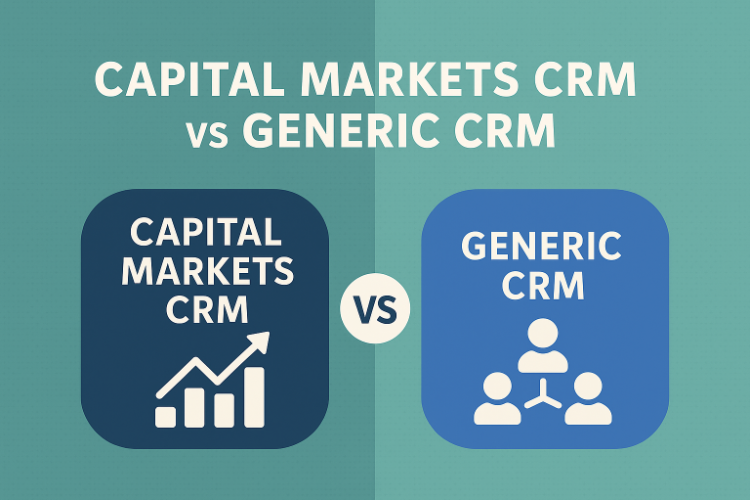Capital Markets CRM vs Generic CRM: What’s the Difference?

Connections are crucial for capital market companies. Although establishing, fostering, and preserving connections is essential to dealmaking, it can be difficult. Deal cycles are lengthy and intricate. It requires more than a spreadsheet and a good memory to manage relationships across many years. Compared to other industries, capital market procedures are usually more complex and multidimensional. Additionally, security and compliance are particularly important for capital markets companies.
While many sectors, particularly those with brief, transactional sales cycles, may get by with a basic customer relationship management (CRM) platform, capital markets companies require a CRM solution tailored to their requirements.
Capital Market CRM vs Generic CRM: Understanding the Core Differences
When it comes to managing relationships, deals, and compliance, the right CRM can make or break your workflow. But not all CRMs are created equal. Capital markets teams require highly specialized features that go beyond what traditional tools offer. So, what separates a capital markets CRM from generic CRM solutions? Let’s break it down.

What Is a Capital Markets CRM?
A capital markets CRM is a purpose-built platform tailored to the workflows and complexities of investment banks, advisory firms, and capital markets teams.
Unlike a standard CRM, these solutions are made to support:
- Relationship-based sales cycles: Deals in capital markets are all about trust and long-term connections.
- Deal origination: Finding and starting new, complex deals.
- Regulatory tracking: Keeping records to meet strict government rules.
- Team collaboration: Helping different team members work together smoothly on big transactions.
A CRM for capital markets doesn't just track names and potential sales. It keeps an eye on specific projects (mandates), the progress of deals (pipelines), and every interaction with investors in real-time.
What Defines Generic CRM Solutions?
Generic CRM solutions are designed for broad industries like retail, tech, or service-based businesses. They focus on short sales cycles, lead generation, and basic customer service workflows. While highly configurable, they often lack built-in functionality for compliance, multi-party deals, or investment data integrations—features critical to capital markets teams.
While you can often change or "configure" these generic CRMs to some extent, they usually don't have built-in features for things like:
- Compliance: Meeting complex financial regulations.
- Multi-party deals: Deals involving many different companies or people.
- Investment data integrations: Connecting with systems that provide financial market data.
These missing features are super important for capital market teams.
Why Do Capital Markets Teams Need Specialized CRM Tools?
Capital markets professionals operate in a high-stakes, high-complexity environment. A specialized CRM for capital markets firms provides:
- Deep Relationship Intelligence: It helps you understand all your connections across a vast network of investors and clients. Who knows whom? Who has worked together before? A specialized CRM can show you.
- Deal Lifecycle Tracking: From the first idea to the final handshake, it tracks every step of a deal, including all the necessary approval stages.
- Compliance Logging & Audit Trails: Every communication and action is recorded, creating a clear history that can be reviewed for regulatory checks. This is vital for avoiding legal issues.
- Integration with Financial Data: It connects directly with important financial data providers like Bloomberg or Refinitiv, bringing all the market information you need right into your CRM.
- Secure Access Controls: Only the right people can see sensitive information about deals and clients, keeping your data safe.
These are not standard features in generic CRM solutions, making specialized CRMs a necessity, not a luxury.
How Does a Capital Markets CRM Improve Team Efficiency?
A capital markets CRM centralizes client data, deal updates, communication logs, and investor interactions in one place. It enables real-time collaboration among bankers, analysts, and legal teams, cutting down on miscommunication and delays. Built-in automation for compliance checks, reminders, and reporting also frees up time for deal-making, rather than admin work.
The Power of Automation & Integration
Can a Generic CRM Be Customized for Capital Markets?
Technically, yes—but it comes at a cost. Customizing a generic CRM solution to meet capital markets' needs often requires significant time, budget, and third-party developers. Even then, the result may lack the depth, reliability, or regulatory functionality that comes out of the box in a purpose-built capital markets CRM. In most cases, specialized CRMs deliver faster ROI and stronger adoption.
What Are the Key Features to Look for in a CRM for Capital Markets Firms?
When evaluating CRMs, capital markets teams should look for:
- Deal pipeline management with custom stages
- Investor and client relationship mapping
- Compliance and regulatory support
- Secure document and note sharing
- Integration with email, calendars, and financial tools
- Real-time dashboards and reporting
These features ensure the CRM actively supports your team’s success, not just stores data.
How Does a Capital Markets CRM Enhance Deal Origination?
Capital markets CRMs provide insights into past mandates, investor preferences, and historical engagement. This context helps bankers target the right opportunities with the right approach, increasing the chances of winning deals. They can also surface warm leads by analyzing relationships and referral paths—something generic CRM solutions typically can’t do out of the box.
How Important Is Compliance Tracking in a Capital Markets CRM?
Capital markets operate under very strict rules and regulations. A good CRM for capital markets firms offers built-in compliance tracking, which includes:
- Audit trails: A detailed record of who did what, when.
- Permission-based access: Ensuring only authorized individuals can view sensitive data.
- Communication logging: Recording all client and deal-related communications.
- Regulatory alerts: Reminders about important deadlines or compliance requirements.
These safeguards are crucial for protecting your firm from costly mistakes, fines, and legal risks – features that are rarely found in generic CRM solutions. This is particularly vital for areas like investment banking and M&A or private equity where regulatory scrutiny is intense.
What Role Does Integration Play in Choosing the Right CRM?
A: Integration is critical. A capital markets CRM should integrate seamlessly with financial data platforms, email clients, calendars, and document management systems. This creates a unified workflow, where teams don’t need to jump between tools or manually update data, improving productivity and data accuracy.
How Can a CRM Impact Client Retention in Capital Markets?
A: By capturing every interaction, preference, and milestone in one place, a capital markets CRM helps bankers maintain stronger, more personalized relationships. Automated follow-ups, task assignments, and reporting help ensure no touchpoint is missed. This leads to better service and higher client retention—something that’s often overlooked with generic CRM solutions focused only on acquisition.
Conclusion: Choose the Right Tool for the Right Job
In capital markets, success depends on speed, precision, and informed decisions. InsightsCRM is engineered for that world, while generic CRM solutions are better suited for transactional industries. If you’re part of a capital markets firm, investing in the right CRM isn’t just a tech decision—it’s a strategic move toward better deal flow, stronger relationships, and operational excellence. Contact InsightsCRM today to get access to the most powerful CRM solutions.
Also Read: Choosing the Right Capital Markets CRM: Key Factors to Consider
FAQs: Capital Markets CRM vs Generic CRM
What is a capital markets CRM?
A capital markets CRM is a specialized customer relationship management tool designed for investment banks and advisory firms. It supports deal tracking, compliance, and investor relationship management.
How is a capital markets CRM different from a generic CRM?
Unlike generic CRM solutions, a capital markets CRM is built for complex deals, regulatory compliance, and multi-layered relationships, offering deeper functionality for capital markets professionals.
Why do capital markets firms need a dedicated CRM?
Firms need a CRM for capital markets to manage long sales cycles, regulatory requirements, investor mapping, and real-time collaboration—all of which are absent in traditional CRMs
Can a generic CRM be adapted for capital markets?
Yes, but heavy customization is often required. Specialized CRMs offer faster setup, better performance, and more relevant features for capital markets teams.
What features should a capital markets CRM include?
Look for deal lifecycle management, relationship intelligence, compliance tracking, secure collaboration, and integrations with financial data tools.
